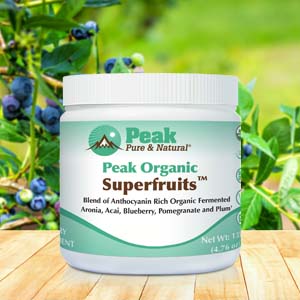Get Easy Health Digest™ in your inbox and don’t miss a thing when you subscribe today. Plus, get the free bonus report, Mother Nature’s Tips, Tricks and Remedies for Cholesterol, Blood Pressure & Blood Sugar as my way of saying welcome to the community!
How the skins of some fruits could slow the damage of MS

I don’t remember exactly how old I was when my mother was diagnosed with multiple sclerosis. What I remember is that during that summer my mom couldn’t get off our couch at all because if she moved, turned her head or was jostled at all, she would get so dizzy that she would vomit.
Fortunately for our family, in the years since then, she has been one of the “lucky ones.”
Although my mom has trouble walking and sometimes used a cane or a scooter, she never got as bad as she did that first summer.
Yet, for my mom and the 2.5 million others in the world living with MS — mostly women, by the way — daily challenges are a reality of life. The help available, even from the most knowledgeable specialists, is spotty at best… and there is no cure for the debilitating disease.
Now, however, thanks to a surprising scientific study, there could be hope even for those who have suffered from MS for years or even decades.
Found in apples, prunes and herbs
A team of researchers from Thomas Jefferson University has just completed a ground-breaking study testing the power of a natural compound to reverse the damage MS inflicts on the nervous system.
This compound — known as ursolic acid — is found in the peel of apples and prunes as well as some herbs, like rosemary.
The researchers used a lab-grade purified form of ursolic acid in mice that had established MS. This is quite different from past experiments which have generally focused on the acute phase of the disease rather than the chronic phase because it’s been assumed that there wasn’t much that could be done to help higher levels of damage to nerves, brain cells and the myelin sheath of the spinal cord.
While the researchers treated these chronic-stage mice for 60 days, they began to see an improvement in as little as 20 days.
In fact, the mice who were paralyzed at the start of the experiment regained their ability to walk (despite lingering weakness) after treatment!
According to the researchers, the supplement not only helped to reduce future neuron damage due to MS, but it also boosted the maturation of cells that make myelin and reversed the damage that was already present.
This is key since in patients with MS the body’s immune system attacks the myelin, leaving nerve fibers bare and uninsulated, triggering many of the symptoms MS patients suffer from.
“It’s not a cure, but if we see a similar response in people, it would represent a significant change in quality of life. And most significantly, it’s a reversal, which we really haven’t seen before with other agents at such a late stage of disease,” said Guang-Xian Zhang, Ph.D., co-senior author and professor of neuroscience at the Sidney Kimmel Medical College at Thomas Jefferson University.
Fruit or supplement?
If you’re like me and know someone with MS, or you have MS yourself, your first thought with this news is probably, “I have to get to the grocery store to buy fruit!”
And, of course, that could work.
In the study, the team used a lab-purified version of ursolic acid, which if future studies go as they hope, will become a medication available to the 1 million people suffering from MS in the United States alone.
However, that could take years and I wondered if, other than mom increasing her fruit intake, there could be another way for her to up her levels of the compound — sooner rather than later.
And luckily, I found one… Ursolic acid is sold as a dietary supplement and a simple search online can help you choose one.
But there is one thing to note — the researchers say that ursolic acid can be toxic at high doses, so be sure to follow the directions of any reputable supplement you choose.
Most ursolic acid supplements recommend doses ranging from 100 mg to 250 mg. In the study, the mice received daily doses of 25 mg, but, of course, they’re much smaller than we are. A fuji apple a day could help you get about 65 mg.
Editor’s note: Did you know that when you take your body from acid to alkaline you can boost your energy, lose weight, soothe digestion, avoid illness and achieve wellness? Click here to discover The Alkaline Secret to Ultimate Vitality and revive your life today!
Sources:
- MS Statistics — Multiple Sclerosis News Today
- Compound in fruit peels halts damage and spurs neuronal repair in multiple sclerosis — Science Daily













